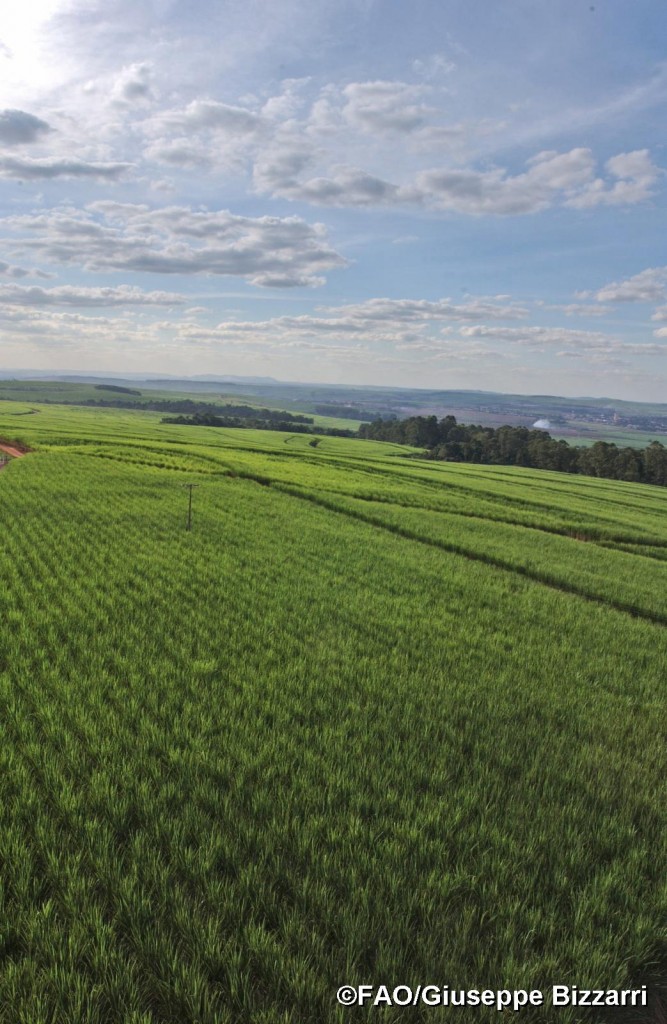
By Stevie DuFrense, Becca Haydu, and Cara Weber
The issue of biofuels and their impacts on world food security is a contested topic here at CFS 40 in Rome. The text is up for negotiation as civil society works to influence the voting member governments of the CFS. Students from the United States, Becca, Cara and Stevie, have been following U.S. biofuels policy and its impacts on world food security.
Monday afternoon’s roundtable discussion began with a presentation from the High Level Panel of Experts (HLPE) report and Harry de Gorter, agricultural trade expert from Cornell University. Their presentations highlighted the connection between biofuels and price volatility in food commodities, such as sugar cane and corn, as well as developmental potentials. de Gorter explained that for every one-cent increase in biofuels price, there is a four-cent increase in corn prices. This strong link began in October of 2006, and contributed to 79% of the food price spikes in the 2007-08 crisis, which left thousands of people hungry and food insecure.
Despite this direct link between biofuels and food price volatility, the United States and many other countries, including Canada, Brazil and the European Union, have mandates(1) on biofuels. Canada currently maintains a 5% domestic ethanol mandate on use while the U.S. is working towards a target of 136 billion liters of biofuels blended into transportation fuels by 2022. The U.S. is also the world’s largest producer of ethanol, with Brazil following at a close second. Combined, their production accounts for 87% of global ethanol production. The US government claims that biofuels policies are an effort improve sustainable “green” energies while moving away from fossil fuel dependence. This connection with the global market means that biofuels policy in the U.S. directly impacts food security around the world.
While the U.S. is reluctant to name biofuels a major contributing factor to food price volatility, civil society is pressuring governments and openly criticizing the decision box. In the civil society interjection during the roundtable, Sylvia Mallari of the Asian Peasant Coalition and the Philippine Peasant Movement asserted that “for small food producers, biofuels means greater hunger, poverty and displacement.” Civil society demands that the CFS recognize the negative impacts of biofuels on food security and refrain from promoting their use and production. These negative impacts go beyond price volatility to include environmentally degrading monoculture practices, increased competition for land and water and the oppression and displacement of indigenous people, women, and small farmers across the developing world. Civil society has taken a strong stand on the complete eradication of biofuels mandates by pushing for the integration of a strong human rights framework and recognition of the Right to Food in the biofuels decision box.
The success of biofuels has far from reached initial industry expectations. Adding to the complicated issue, if immediate eradication of mandates was enacted, many economies, including the United States, would be drastically affected. Subsidies and mandates have created dependence on ethanol corn production for many farmers in the midwestern U.S. Unfortunately, production costs for farmers are now almost equivalent to the prices farmers receive for their product leaving them with almost no income, creating further dependence on the direct support from government via ethanol subsidies. Speculation suggests immediate eradication of subsidies would bankrupt not only many midwestern farmers, but also the banks and tangential production jobs in the ethanol industry. The US congress created these subsidies and mandates to incentivize farmers and now it is the farmers and workers who are bearing risks of the industry’s collapse.
Despite the tireless work civil society to present their position and pressure governments, the question remains as to whether we are actually being heard. The United States strongly supports the existing decision box and will not recede its position on biofuels mandates. During the roundtable, the U.S. position was echoed through statements from Canada, the European Union and Australia. Few, if any, governments have responded positively to pressures from civil society. Negotiations are scheduled to continue Wednesday and the text will be finalized. Civil society will decide how we hold our ground in this space, if we walk out of the forum in refusal to legitimize a weak decision box, or if we stay in attempt to pressure the governments. Stay tuned for updates from the [earth] delegation in Rome.
If you’re from the U.S., do you feel your government is representing your interests? If you’re not from the U.S., how do you think U.S. policies might impact your country?
1. Mandates are a specified minimum amount
Let me get my bias out of the way: I use and have commercially made biodiesel, a biofuel. The stuff I use is made from waste.
Not all biofuels are created equal but I understand the usefulness of using a catch-all term to describe most of the fuels out there. What I see is the increase in price of two things that are dependent on petroleum. Biofuels are often pegged to petroleum fuel prices and many/most of these mono-culture crops are very dependent on oil. Take a look at this oil price graph https://raisethehammer.org/static/images/global_oil_production_consumption_price_by_month_2000-2010.png This timeframe matches up with the one presented by Mr. de Gorter. There is a more thorough explanation of this in the film FUEL (Disclosure: I was involved in the production of the film) and I would be happy to show you all the clip when you get back. This a super complex system that I think shouldn’t be portrayed as “biofuels = human rights violation” or “yay biofuels.” If you do need to talk in an “us vs. them” fashion, consider using more specific terms like first-generation biofuels, corn ethanol, or palm biodiesel (palm-oil-methylesters or POME).